Research
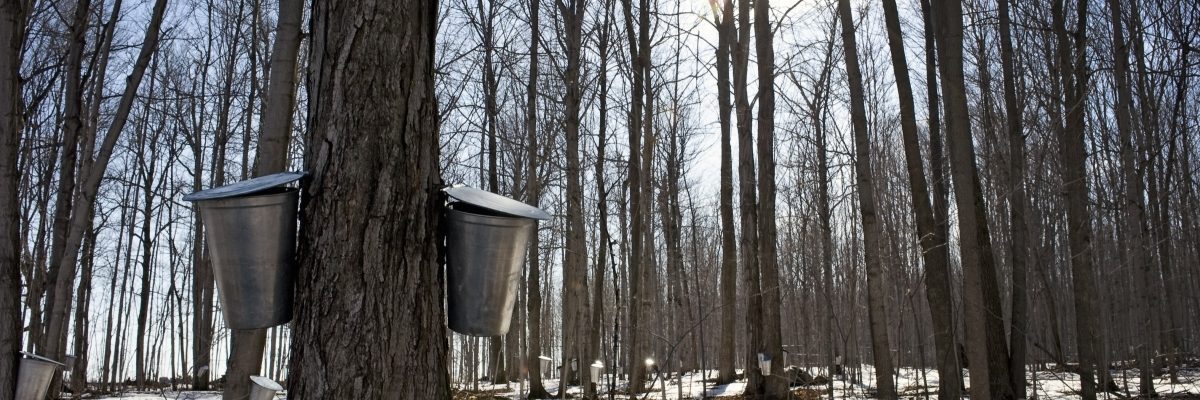
The research component of the Wisconsin Extension Maple Program seeks to understand how Extension, foresters, equipment suppliers, and others can effectively support existing maple syrup producers in Wisconsin, as well as how they can encourage more Wisconsinites to begin producing maple syrup. Here is an overview of our completed research projects to date.
Jump to section:
- Using Facebook Ads to Reach Potential New Producers
- Comparing the Outreach Needs of Non-commercial and Commercial Producers
- Opinion Leaders’ Role in Sharing Knowledge about Maple Production
- How Foresters Can Provide Sugarbush Advice Effectively
- Opportunities and Challenges for Wisconsin Maple Production
Using Facebook Ads to Reach Potential New Producers
Hershberger, S., Shaw, B., Moen, S., Johnson, T., & Gorby, T. (2024). Promoting small-scale maple syrup production on Facebook: A field experiment testing emphasis message frames. Journal of Agriculture, Food Systems, and Community Development 13(4), 1–26. https://doi.org/10.5304/jafscd.2024.134.012
In November 2023, we ran a Facebook ad campaign encouraging non-producers to begin maple syrup production. We tested four different message frames: building community, food self-sufficiency, spending time in nature, and the lifestyle of working the land.
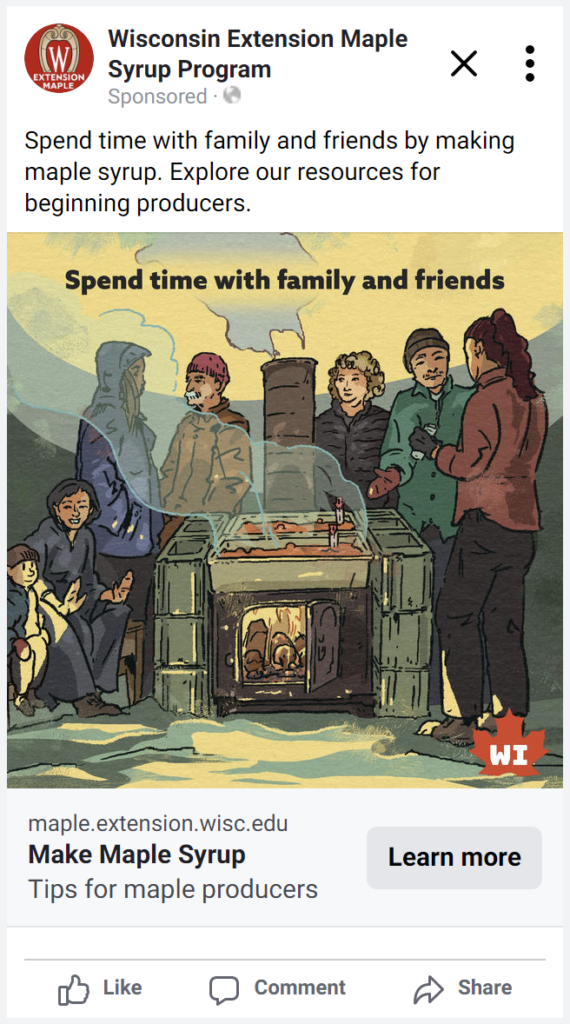
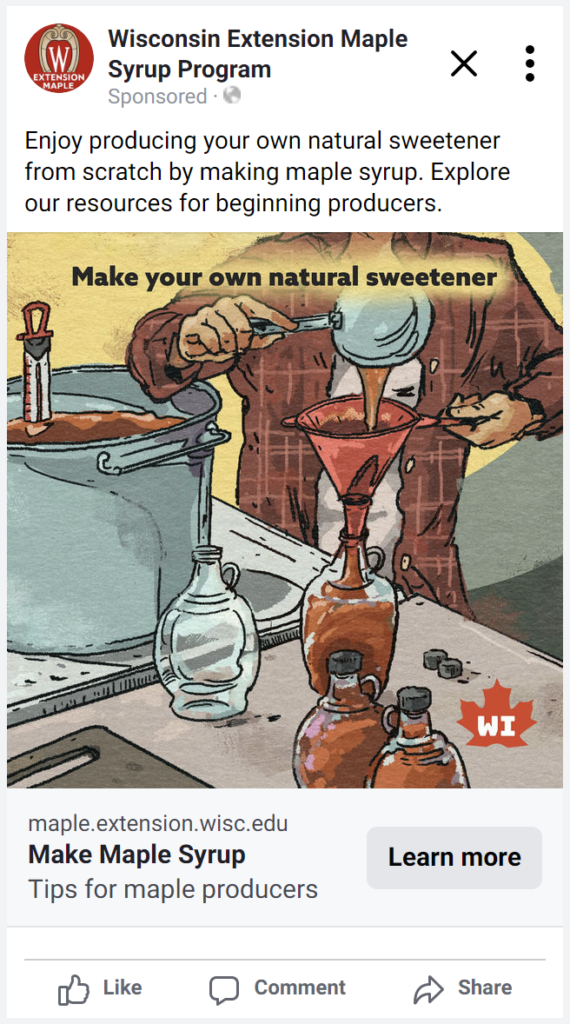
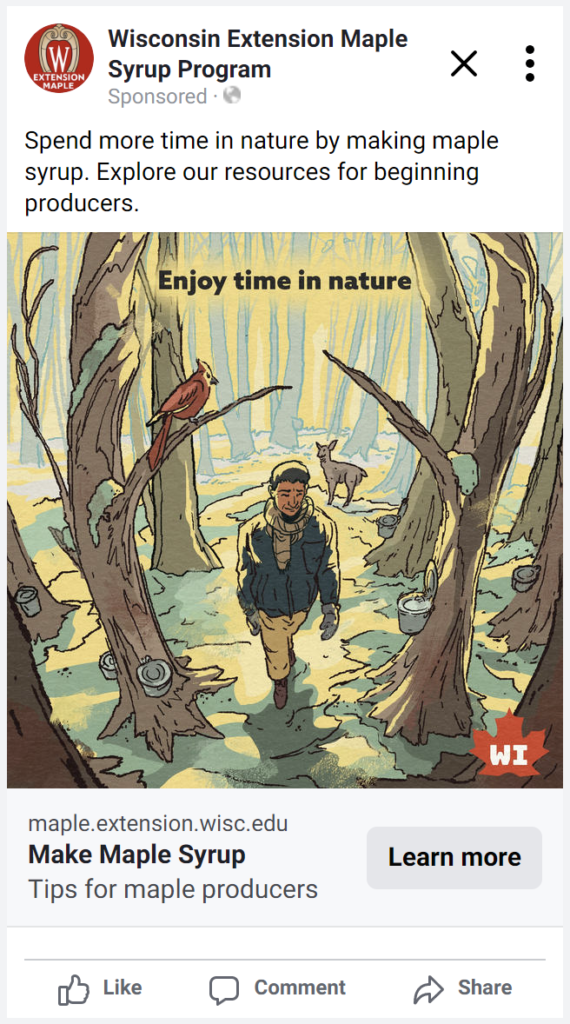
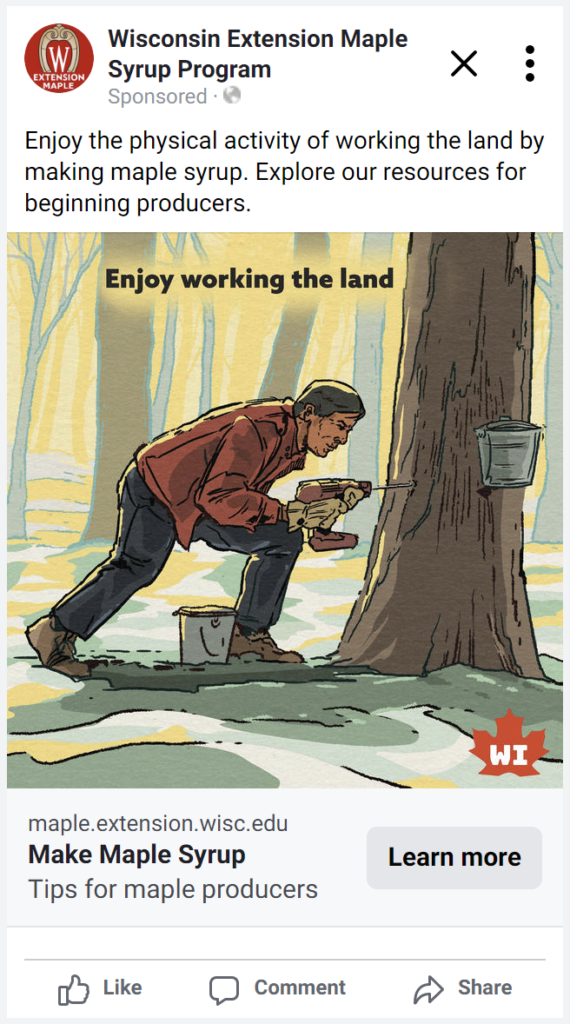
Framing maple syrup production in terms of the lifestyle of working the land was the most cost-effective message overall. Among people ages 18-54, this frame also attracted the most clicks. However, among people ages 55+, framing maple syrup production as a means of food self-sufficiency generated more clicks than the other frames, while emphasizing the time in nature involved in producing maple syrup led to the most public engagement.
Our results can inform strategic messaging for future outreach aimed at bringing more people into the world of maple syrup production.
Comparing the Outreach Needs of Non-commercial and Commercial Producers
Hershberger, S., Shaw, B., Gorby, T. A., Solin, J., Robinson, P., Tiles, K., Cook, C., & Chang, C.-T. (2023). Comparing Motivations, Learning Interests, and Barriers to Expansion Among Non-commercial and Commercial Maple Syrup Producers in Wisconsin. Small-scale Forestry, 23, 127-157. https://doi.org/10.1007/s11842-023-09557-9 (free PDF at https://rdcu.be/dsm19)
Using data from the needs assessment, we compared the motivations, learning interests, desire to expand, and barriers to expansion among three categories of maple producers: non-commercial, small commercial, and large commercial producers.
We found that spending time in nature is a strong motivation for over 70% of producers in all three categories. The top learning interest of large commercial producers is product diversification. On the other hand, non-commercial and small commercial producers most want to learn about operating concentrating and cooking technology and forest health management.
The sugarmakers with a higher desire to expand tend to be those who are more motivated by finances, have fewer seasons of sugarmaking experience, or are newer landowners. Collecting and handling sap efficiently and a lack of time are each a barrier for around half of non-commercial and small commercial producers. Workforce availability and a lack of capital for equipment are each a barrier for around half of both small and large commercial producers. Read more findings in this blog post.
Our results show which topics should be prioritized for educational programming and can inform equipment suppliers’ marketing efforts. They also point to the need for workforce development experts to design industry-appropriate strategies to address workforce challenges. Ultimately, efforts to reach a specific producer category should leverage the differences we found, while efforts to connect with the entire sugarmaking community should be framed around the similarities across categories.
Opinion Leaders’ Role in Sharing Knowledge About Maple Production
Chang, C.-T., Gorby, T. A., Shaw, B. R., Solin, J., Robinson, P., Tiles, K., & Cook, C. (2023). Influence of learner characteristics on optimal knowledge acquisition among Wisconsin maple syrup producers. The Journal of Agricultural Education and Extension. Advance online publication. https://doi.org/10.1080/1389224X.2023.2254286
Using data from the needs assessment, we explored how producers’ motivations, opinion leadership, and interest in new technologies influences whether they get information from informal sources (such as other producers or equipment suppliers), formal sources (such as foresters, government employees, or Extension specialists), or both.
We found that in general, producers turn to informal peer networks for information, rather than formal outreach programs or professional services. Maple producers who are opinion leaders or early adopters of new technologies are more likely to use both formal and informal knowledge networks than producers who are not influencers in their community. Additionally, producers who are extrinsically motivated by profitability, family legacy, or community customs are more likely to turn to both formal and informal information sources than producers who are intrinsically motivated to learn about sugaring.
Based on these findings, we suggest that outreach programs on maple production and innovation should aim to reach community opinion leaders in the industry, who can then be trained to serve as spokespersons for stewardship practices. Outreach that emphasizes business profitability, family tradition, and social norms might also increase producers’ willingness to engage in programs on sugarbush management or forest conservation. Finally, we recommend that peer learning be integrated into broader education and assistance programs.
How Foresters Can Provide Sugarbush Advice Effectively
Chang, C.-T., Shaw, B. R., Solin, J., Gorby, T. A., & Robinson, P. (2023). Influence of Forester Traits and Advising Approaches on Landowners’ Intention to Follow Recommendations About Maple Sugarbush Management among Sap Producers in Wisconsin. Journal of Forestry, 121(5–6):408–418. https://doi.org/10.1093/jofore/fvad027
Using data from the needs assessment, our team examined how maple producers respond to professional advice about their sugarbushes from foresters.
We found that when a producer perceives that a forester is competent, trustworthy, and shares similar values regarding forest management, they are more likely to perceive the forester’s advice to be helpful and more likely to intend to implement the advice. Similarly, when a producer perceives that a forester is actively listening to them, they are more likely to view the advice as high-quality and intend to use it. On the other hand, when a producer perceives the advice as unsolicited, they tend to view it as lower quality but might still use the advice. The perceived traits of the forester have the largest influence on how producers react to advice.
Based on our findings, we recommend that training programs for foresters integrate communication skills into the curriculum. Communication training will help foresters convey their credibility and trustworthiness, engage in active listening, and avoid the perception that they are imposing advice on maple producers.
Opportunities and Challenges for Wisconsin Maple Production
In 2022, we worked with our partners to develop and run a comprehensive needs assessment survey. With responses from 682 maple producers, the survey examined the landscape of Wisconsin maple syrup production along with current opportunities and challenges. You can read the results in the survey report, entitled “Opportunities to Expand Maple Syrup Production in Wisconsin: Results from a Statewide Survey of Maple Syrup Producers.”




